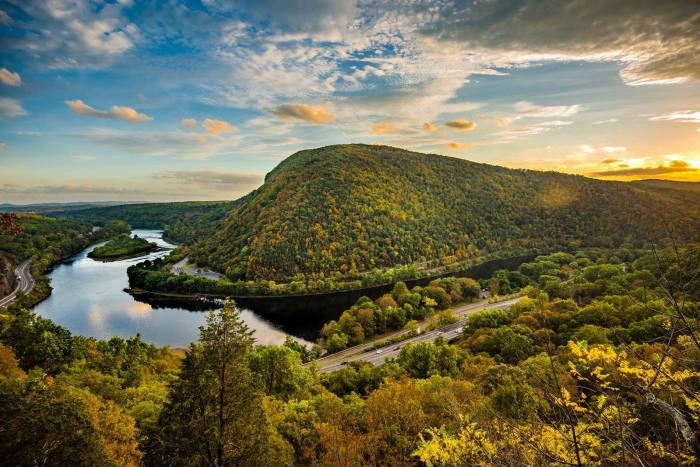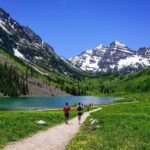Weekend Hiking Trips: Escape the ordinary and immerse yourself in the breathtaking beauty of nature. This isn’t just about hitting the trails; it’s about crafting an unforgettable adventure, from meticulous planning and gear selection to conquering challenging terrains and capturing breathtaking memories. We’ll cover everything from finding the perfect trail for your skill level to mastering essential survival skills and budgeting your trip for maximum impact.
Get ready to discover the transformative power of a weekend in the wilderness.
This comprehensive guide delves into every aspect of planning and executing successful weekend hiking trips. We’ll explore diverse trail options, ranging from beginner-friendly paths to challenging climbs that test your limits. Learn how to pack light yet efficiently, navigate using maps and compasses, and prevent common hiking injuries. We’ll also share tips on enhancing your experience through photography, birdwatching, and mindful appreciation of the natural world.
Finally, we’ll provide practical advice on budgeting and finding affordable options to make your weekend hiking trip both memorable and accessible.
Planning Weekend Hiking Trips

Planning a successful weekend hiking trip requires meticulous preparation. From choosing the right location and securing accommodations to packing efficiently and ensuring your safety, every detail contributes to an enjoyable and memorable experience. Overlooking even minor aspects can significantly impact your trip, potentially turning a relaxing getaway into a stressful ordeal. This guide provides a structured approach to planning your next weekend adventure, minimizing potential pitfalls and maximizing your enjoyment.
Sample Rocky Mountain Hiking Itinerary
This itinerary Artikels a potential weekend hiking trip in the Rocky Mountains, focusing on accessibility and a balance of activity and relaxation. Remember that travel times and distances can vary based on trail conditions and your chosen starting point. Always check current trail conditions and weather forecasts before embarking on your journey.
Day 1:
Morning (8:00 AM): Depart from Denver, Colorado. (Estimated travel time to Estes Park: 1.5 – 2 hours, depending on traffic and route.)
Late Morning (10:00 AM – 12:00 PM): Arrive in Estes Park, check into lodging, and grab lunch. (Consider the YMCA of the Rockies or a local hotel for lodging options.)
Afternoon (12:00 PM – 5:00 PM): Hike a portion of the Emerald Lake Trail (approximately 3 miles roundtrip, moderate difficulty). Enjoy the scenic views and take breaks as needed.
Evening (5:00 PM – 8:00 PM): Dinner in Estes Park, followed by relaxation at your lodging.
Day 2:
Morning (8:00 AM – 12:00 PM): Hike a section of the Bear Lake Loop Trail (approximately 2.5 miles roundtrip, easy to moderate difficulty), known for its stunning views of Hallett Peak and Flattop Mountain. This trail offers various shorter loops, accommodating different fitness levels.
Afternoon (12:00 PM – 2:00 PM): Lunch at Bear Lake, enjoying the alpine scenery.
Afternoon (2:00 PM – 4:00 PM): Explore Estes Park, visit shops, or enjoy other activities.
Evening (4:00 PM): Depart from Estes Park, returning to Denver.
Essential Hiking Gear and Supplies Checklist
Proper gear is paramount for a safe and comfortable hiking experience. Categorizing your supplies ensures you haven’t forgotten anything crucial. This checklist covers essential items; adapt it to your specific needs and the anticipated conditions.
Navigation: Map, compass, GPS device (with extra batteries), and knowledge of how to use them. It’s crucial to have backup navigation methods in case of electronic failure.
Sun Protection: Sunscreen (SPF 30 or higher), sunglasses, hat with a brim.
Insulation: Layers of clothing appropriate for changing weather conditions, including a waterproof and windproof outer layer. Always pack for unexpected temperature drops, even in summer.
Illumination: Headlamp or flashlight with extra batteries.
First-aid supplies: Comprehensive first-aid kit including bandages, antiseptic wipes, pain relievers, blister treatment, and any personal medications.
Nutrition: High-energy snacks (trail mix, energy bars), sufficient water (at least 2 liters per person per day), and meals for each day.
Repair kit and tools: Knife or multi-tool, duct tape, and any necessary repair items specific to your gear.
Finding and Reserving Campsites or Lodging, Weekend Hiking Trips
Securing accommodations is a crucial step in planning your trip. Popular hiking areas often fill up quickly, especially during peak season.
Online Booking Platforms: Websites like Recreation.gov (for US National Parks and Forests), ReserveAmerica, and Hipcamp offer online booking for campsites and various lodging options near popular trails. These platforms often allow you to filter by amenities, dates, and location, making your search easier.
Direct Booking with Lodges and Hotels: Many lodges and hotels located near hiking trails accept direct bookings through their websites or by phone. This approach can be particularly useful for securing lodging in smaller, less-visited areas.
Local Tourist Information Centers: Contacting local tourist information centers can provide valuable insights into available campsites and lodging options, as well as potential last-minute availability.
Tips for Efficient Packing
Packing light is essential for a comfortable hike. Every extra ounce adds up, impacting your energy levels and overall enjoyment.
Prioritize Essentials: Focus on packing only the absolutely essential items. Leave behind anything non-essential or that can be easily substituted with a lighter alternative.
Use Compression Bags: Compression bags help reduce the volume of clothing and other soft items, maximizing space in your backpack.
Layer Your Clothing: Packing layers of clothing allows you to adapt to changing weather conditions without carrying excessive weight.
Choose Lightweight Gear: Opt for lightweight gear whenever possible, such as a lightweight backpack, tent, and cooking equipment. Modern materials offer significant weight reductions without compromising durability.
Pack Food Strategically: Choose lightweight, high-energy foods to minimize weight while maximizing nutritional value. Pre-portioning your food into zip-top bags can also help save space and weight.
Weekend hiking trips offer a unique blend of physical challenge, mental rejuvenation, and profound connection with nature. By following the strategies and tips Artikeld in this guide, you can transform your weekend escapes into truly rewarding adventures. Remember, careful planning and preparation are key to a safe and enjoyable experience. So, pack your bags, lace up your boots, and embark on a journey that will leave you feeling refreshed, invigorated, and deeply connected to the stunning landscapes that surround us.
Embrace the challenge, savor the moments, and create memories that will last a lifetime.

